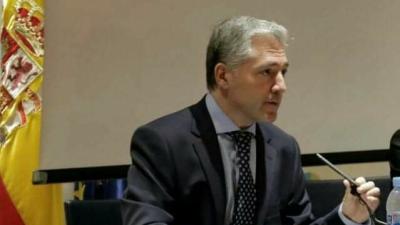The regional and local elections of 28 May marked a change of course in Spanish politics (see Spain turns right). A change made even more decisive by the call for a general election by President Pedro Sánchez.
Sánchez’s move to call the elections for 23 July served several purposes: silencing internal criticism of the poor results, avoiding further erosion of himself and the government, and leaving very little room for manoeuvre for the left-wing Podemos and Sumar. Internally, the move worked and Pedro Sánchez appeared before the Socialist deputies and senators in a “Bulgarian-style” meeting, where all those present showed their support for the Socialist leader’s move to stop “the extreme right and the right extreme”, which is how the president defined VOX and the Popular Party. Despite the problems generated within the Socialist Party with the drawing up of the electoral lists and the imposition of several candidates by Sánchez, the PSOE remains united. But this is not enough, and the chances of an electoral victory are very slim. This is why Sánchez has embarked on a tour of different media and has even proposed six debates with the leader of the Popular Party, Alberto Núñez Feijóo, who has accepted one on 10 July. VOX, thanks to the manoeuvres of the PP, has been left out of the debates. As part of President Sánchez’s media tour, one must mention especially the programme “El Hormiguero”, which exemplifies the PSOE’s North Korean style. To avoid the booing he always receives in the street, President Sánchez demanded that the audience that attended the programme, applauding him enthusiastically, be made up of police and socialist militants.
To his left, the electoral collapse of Podemos has left him without strength when it comes to negotiating with his former colleagues in Sumar. The Podemos split, led by vice-president and Labour Minister Yolanda Díaz, has brought forces that previously supported Podemos into its candidacy and has not been taken into consideration by the leaders of the purple party. Podemos candidates have been relegated to distant positions on the lists and most have little chance of being elected (Ione Belarra is the best positioned as number 5 for Madrid), but the most definitive sign of the humiliation and total surrender of Podemos has been the exclusion of Irene Montero, the Minister for Equality and the most visible face of the radical policies approved by the coalition government. The driving force behind the trans law, promotion of abortion, radical feminism and the botched “only yes is yes” law, which has benefited more than 1,200 sex offenders, has been left out of politics after being vetoed by Sumar and its partners, who considered her to be detrimental to their candidacy. Irene Montero has also been sentenced by the Supreme Court to pay 18,000 euros to Rafael Marcos for accusing him of being an “abuser”, despite his prior acquittal by the courts. On the other hand, Marcos’ ex-wife, María Sevilla, former president of the Infancia Libre association (invited to speak in Parliament by Podemos), who was convicted for kidnapping her son and keeping him hidden and out of school, was pardoned by the government. Irene Montero’s departure from any position of political responsibility is very good news, but those who cheered her on, applauded her and approved her laws are the ones who now dismiss her as a stinker. They are the real problem.
Sumar is campaigning on impossible promises to “make people happy”, reminiscent of when the hippie movement ran a pig in the US elections, Pigasus “the immortal”, who promised eternal life. Sumar has proposed to reduce the working week from 40 to 37.5 hours in 2024 and to open a debate to reach 32 hours. A reduction of hours that will be accompanied by a wage increase, of course. Yolanda Díaz has also promised a “universal inheritance” of €20,000 to young people on their 18th birthday so that they can “start a business or train themselves”, or quotas for immigrants in public institutions, companies and organisations. However, the media point to a good result for Sumar in the polls, some even putting Yolanda Díaz’s coalition ahead of VOX, in what appears to be an attempt to give oxygen to the extreme left or to encourage the “useful vote” for the PP.
PP and VOX reach agreements
After the euphoria of the good results of the Popular Party and VOX, Alberto Núñez Feijóo began a confusing series of declarations proposing to the socialists that in each region or locality the most voted list should govern, so that the PP would not have to make a pact with VOX. As predictable, the socialists did not respond, but Feijóo’s proposal caused rejection and unease among a good part of their voters and affiliate. It even gave rise to surreal situations, as in case of the former socialist president of Extremadura, Guillermo Fernández Vara, who had announced his retirement from politics and requested his reinstatement as a forensic doctor. Faced with Feijóo’s offer, the following day Vara proposed himself as a candidate for the regional presidency (the PSOE was the most voted party in Extremadura, but the majority is held by PP and VOX) and has finally postponed his retirement until after the general elections. The attitude of PP leaders raised serious doubts about the formation of future regional governments, but these doubts began to dissipate on 13 June, with the agreement between PP and VOX to govern the Valencian Community. That agreement, which at the same time was also concluded in 140 cities and 5 provincial capitals (Burgos, Ciudad Real, Guadalajara, Valladolid and Toledo), follows in the footsteps of the government of Castilla y León and is based on five points (according to VOX): freedom, economic development, health and social services, signs of identity and support for families. VOX has won the presidency of the Valencian Parliament, the vice-presidency of the regional government and the ministries of Agriculture, Social Affairs and Education (a number determined by its electoral result: the PP obtained 40 deputies and VOX 13). In Aragón, where the PP needs six seats and VOX has seven, a first agreement has been reached to form the Parliament's Bureau, which will be chaired by VOX MP Marta Fernández. In the Balearic Islands, VOX has not entered the government, although it has agreed on several measures with the PP, including repealing of the trans law and the regional law of historical memory, ending discrimination against Spanish language and the parental Pin so that parents can veto the content taught in schools on issues such as gender identity, feminism or LGTBI.
But it has not all been plain sailing. In Murcia, where the PP is only two seats away from an absolute majority, the PP shared the Parliament's Bureau with the Socialists and practically demanded the free support of VOX. After weeks of disagreements, the Popular Party has offered VOX a negotiation to reach a programmatic agreement based on the PP’s electoral programme; it remains to be seen whether an agreement will be reached as in the Balearic Islands. Finally, in Extremadura, after initial doubts, PP candidate María Guardiola stated on 20 June: “I cannot admit into the government those who deny macho violence, those who use the fat line, those who are dehumanising immigrants and those who display a tarpaulin and throw the LGBT flag in a bin”. However, without VOX’s support the alternative was a repeat election, so just ten days later Guardiola announced a coalition government with VOX in Extremadura: “My word is not as important as the future of the people of Extremadura,” she said.
After securing the coalition government in the Valencian Community, VOX issued a communiqué in which it stated that the agreement, and others where the joint sum of votes with the Popular Party allows for them, represented a political change “to undo the nefarious legacy of the left and return prosperity and hope to Spaniards”. After the formation of the new regional and local coalition governments, something that many did not believe possible before the 28 May elections, the possibility of a national government of PP and VOX, seems much closer.
Read also
José Luis Orella: "The degradation of the national community and society generates weaker, more impressionable and manageable people".
osé Luis Orella is a lecturer in Contemporary History at the CEU San Pablo University, PhD in Contemporary History, specialising in political thought in Spain and Central Europe from the University of Deusto and in Political Law from the UNED.
Álvaro Peñas
Interview with Ludwig Brühl - ADF (Alliance Defending Freedom) International
“There is no place in a free society for the punishing of individuals who share their peaceful and honest views on the important issues of our time”
Álvaro Peñas
Bohdan Chuma: “Ukraine’s history is a normal and typical history of a European nation”
Putin is trying to write a history of the Russian Empire that begins with the Tsarist Empire, continues with Soviet Communism, the Red Empire, and now continues under his government.
Álvaro Peñas
Nacho Montes de Oca: “The best way to disarm the Russian propaganda is to go back to the basic point, which are values”
Nacho Montes de Oca is an Argentinean writer and journalist, known for his books of essays dedicated to historical research and analysis of wars and other contemporary conflicts.














Comments (0)